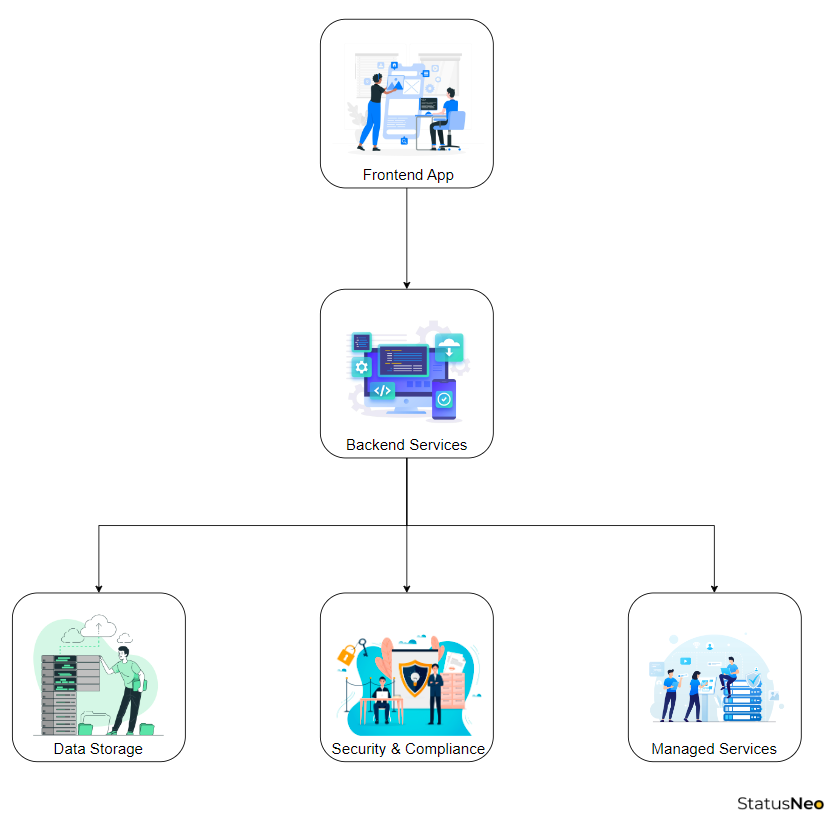GCP Healthcare- Secure & Scalable Solutions
In recent years, the healthcare industry has undergone a significant transformation with the arrival of digital technologies. Cloud computing has played a crucial part in this transformation by providing a scalable and secure infrastructure for healthcare platforms. Google Cloud Platform (GCP) stands out among various cloud providers for its robust security features and scalability. This article will explore how to construct a secure and scalable healthcare platform using GCP services.

Healthcare Platform Architecture
The architecture of a healthcare platform is a crafted structure that has different components to deliver smooth and secure healthcare services to users. Let’s delve deeper into each component of this architecture:
- Frontend Applications:
Frontend applications act as the interface between users and the healthcare platform. These applications, which can be web or mobile-based, give patients access to essential healthcare services such as scheduling appointments, viewing medical records, and communicating with healthcare providers. In the context of Google Cloud Platform (GCP), frontend applications can utilize services like Google App Engine or Google Kubernetes Engine for deployment and scalability. These platforms offer managed environments for running and scaling web and mobile applications, ensuring high availability and performance.
- Backend Services:
Backend services make up the backbone of the healthcare platform, managing business logic, data processing, and communication with databases and external systems. These services are responsible for implementing characteristics such as user authentication, appointment scheduling, billing, and integration with electronic health records (EHR) systems. Google Cloud Platform offers a wide range of services for constructing and deploying backend applications, like Compute Engine for virtual machines, Cloud Functions for serverless computing, and Cloud Run for containerized applications. These services can be combined to create a scalable and resilient backend architecture that meets the demands of modern healthcare applications.
- Data Storage:
Data storage is a critical component of any healthcare platform, as it handles sensitive patient information that must be stored securely and accessed efficiently. Healthcare platforms usually store both structured data, such as patient demographics and medical records, and unstructured data, such as medical images and documents. GCP provides a variety of storage options to satisfy the diverse needs of healthcare applications. Cloud SQL offers managed relational databases for structured data storage, while Cloud Storage provides scalable object storage for unstructured data. In addition, services like Cloud Bigtable and Cloud Firestore are accessible for storing and querying large volumes of
semi-structured data.
- Security and Compliance:
Security and compliance are essential in healthcare, given the sensitive nature of patient data and the regulatory requirements governing its handling and storage. Compliance with regulations such as the Health Insurance Portability and Accountability Act (HIPAA) is crucial for ensuring patient privacy and data security. Google Cloud Platform provides a comprehensive set of security features and compliance certifications to help healthcare organizations fulfill their security and regulatory requirements. These include encryption at rest and in transit, identity and access management (IAM) controls, audit logging, and compliance with industry standards like HIPAA and HITRUST.
Leveraging GCP Services for Security and Compliance
- Identity and Access Management (IAM):
IAM is super fundamental in controlling access to GCP resources within your healthcare platform. Role-based access control (RBAC) super allows you to define granular permissions and assign them to users and service accounts based on their roles and responsibilities. For instance, you can designate certain users as administrators with full access rights, while others may have restricted access to specific resources. In the context of healthcare applications on GCP, IAM enables you to ensure that only authorized personnel, such as healthcare providers and administrators, can access sensitive patient data. By managing access at this level, you mitigate the risk of unauthorized access or data breaches, thus maintaining the confidentiality and integrity of patient information.
- Encryption:
Encryption is super paramount for protecting healthcare data both at rest and in transit. GCP offers robust encryption mechanisms to safeguard data throughout it’s -should be its lifecycle. Cloud Key Management Service (KMS) allows you to manage encryption keys centrally and control access to them. This ensures that sensitive data is encrypted -before being stored in GCP services, such as Cloud Storage and BigQuery. By encrypting data at rest, you add a layer of security, making it hard to understand for unauthorized parties even if they gain access to the underlying storage infrastructure. Similarly, encrypting data in transit using protocols like TLS (Transport Layer Security) ensures that data super remains secure while being transmitted over networks.
- Audit Logging:
Audit logging provides comprehensive visibility into activities and changes within your GCP environment, allowing you to monitor who did what, where, and when. This is critical for compliance purposes, as regulations such as HIPAA require healthcare organizations to maintain audit trails of data access and modifications. GCP’s audit logging capabilities enable you to track user actions, system events, and administrative activities across various services and resources. By analyzing audit logs, you can detect and investigate security incidents, unauthorized access attempts, and compliance violations in real time, thereby enhancing the overall security posture of your healthcare platform.
- Managed Services for Healthcare:
GCP offers specialized managed services super-duper tailored to the unique needs of healthcare applications. For example, the Healthcare API provides a secure and interoperable platform for managing and exchanging healthcare data, enabling seamless integration with electronic health record (EHR) systems and other healthcare IT infrastructure. Additionally, the Cloud Healthcare Consent Management API facilitates the management of patient consent preferences, ensuring compliance with data privacy regulations such as GDPR (General Data Protection Regulation) and CCPA (California Consumer Privacy Act). These managed services empower healthcare organizations to securely store, access, and share patient data while adhering to stringent regulatory requirements.
Scalability and Performance Considerations in GCP
- Managed Services:
GCP’s managed services, like Google Kubernetes Engine (GKE) and Cloud Functions, streamline the process of scaling infrastructure in response to varying workloads. GKE enables automated deployment, scaling, and management of containerized applications, while Cloud Functions allows you to run event-driven serverless functions. This automation ensures that your healthcare platform can adapt to fluctuations in traffic without the need for manual intervention, enhancing scalability and responsiveness Moreover, these managed services abstract away much of the complexity involved in managing infrastructure, allowing healthcare organizations to focus on developing and delivering innovative healthcare solutions. By leveraging managed services, and healthcare platforms they can achieve greater efficiency, scalability, and agility.
- Global Infrastructure:
GCP’s extensive network of data centers spans the globe, ensuring low-latency access to healthcare services for users worldwide. Services such as Cloud CDN (Content Delivery Network) and Cloud Load Balancing further optimize performance, distributing incoming traffic across multiple regions. This distributed infrastructure minimizes latency and improves users’ experience, regardless of geographical location, thereby enhancing scalability and accessibility for healthcare platforms operating on a global scale Furthermore, GCP’s global infrastructure is designed to provide high availability and reliability, with redundant systems and failover mechanisms in place to ensure continuous service delivery. Healthcare organizations can reach a broader audience by leveraging GCP’s global infrastructure.
- Auto Scaling:
GCP’s Auto Scaling feature enables dynamic adjustment of virtual machine instances based on real-time traffic patterns. By analyzing traffic metrics, Auto Scaling automatically scales resources up or down to meet demand, ensuring optimal performance and resource utilization. This capability allows healthcare platforms to handle sudden spikes in traffic without experiencing downtime or performance degradation, maintaining reliability and responsiveness for users. Moreover, Auto Scaling operates seamlessly across a wide range of GCP services, including Compute Engine, Kubernetes Engine, and App Engine, allowing healthcare organizations to scale their infrastructure horizontally or vertically as needed.
Additionally, Auto Scaling can be customized with policies and thresholds to fine-tune scaling behavior and optimize cost-effectiveness.
- Big Data and Analytics:
GCP’s suite of Big Data and Analytics services, like BigQuery and Dataflow, empowers healthcare organizations to derive actionable insights from large volumes of data in a real timeline. BigQuery enables high-speed querying of massive datasets, while Dataflow facilitates stream and batch data processing. By leveraging these services, healthcare platforms can analyze healthcare data efficiently, uncovering valuable insights that drive informed decision-making, improve patient care, and enhance operational efficiency Furthermore, GCP’s Big Data and Analytics services are fully managed, providing scalable and reliable infrastructure for processing and analyzing data without the need for upfront investment hardware or software. This allows healthcare organizations to focus on deriving insights from their data rather than managing infrastructure.

To Sum it up
Building a secure and scalable healthcare platform with Google Cloud Platform requires a strategic approach that leverages GCP’s robust set of services and tools. By adopting managed services for scalability, leveraging GCP’s global infrastructure, implementing auto-scaling mechanisms, and harnessing the power of big data and analytics, healthcare organizations can create platforms that deliver high-performance services while ensuring data security and compliance. As the healthcare industry continues to evolve, GCP remains a trusted partner for building innovative and scalable healthcare solutions that meet the demands of today’s digital healthcare landscape.
Here is the link to my previous blog- DevOps in the Cloud Streamlining Development and Operations








